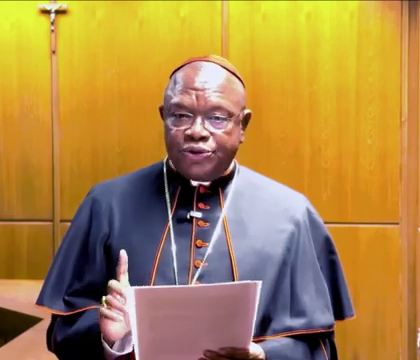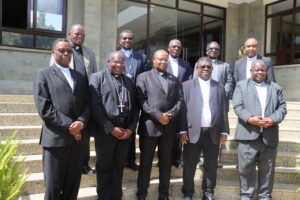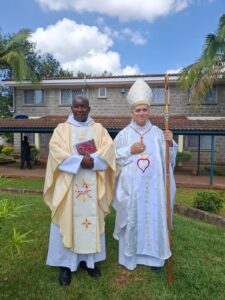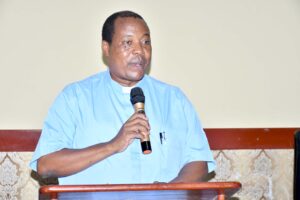Synod on Synodality: Respectful and Fraternal Dialogue, Key in Addressing Polygamy in Africa Says SECAM President

Cardinal Ambogo
Sr. Jecinter Antoinette Okoth, FSSA
In response to the challenge of polygamy in Africa that has been a concern in the Church and also during the first phase of the XVI Ordinary General Assembly of the Synod of Bishops, the President of the Symposium of Episcopal Conferences of Africa and Madagascar (SECAM) has pointed out that this challenge requires ‘respectful and fraternal dialogue.’
Addressing the over 350 delegates attending the ongoing synodal assembly in Rome, Fridolin Cardinal Ambongo revealed that the African continent has developed a four-phase plan and a commission of experts to respond to this concern.
In the Synthesis Report Chapter 16 which focused on the topic ‘Towards a listening and accompanying Church,’ synod delegates proposed that the continental body of the bishops in Africa and the Islands which is SECAM “Promote a theological and pastoral discernment on the question of polygamy and the accompaniment of people in polygamous unions who are coming to faith.”
In his message delivered from Paul VI hall in the Vatican during the 1st general congregation on Wednesday, October 2, the Local Ordinary of the Catholic Archdiocese of Kinshasa in the Democratic Republic of Congo (DRC) said that Polygamy is a well-known reality in many African countries and represents a real pastoral challenge, “as some people joined the Christian faith when they are in a situation of polygamy and there are also baptized people who live in polygamy after their conversion.”
In response to the request made during the first session of the Synod in October 2023 and using the synodal method, the Cardinal said, “We would like to address this question from a pastoral point of view and provide a complete answer to the question, what is the most appropriate form of pastoral to accompany people living in a polygamous relationship?
In this case, the member of the Order of Friars Minor Capuchin (OFM Cap) narrated, that the permanent committee of SECAM, has developed a plan in four phases.
In the first phase, a group of experts was set up who highlighted fundamental elements for an appropriate pastoral response, including the forms of polygamy, motivation, doctrine, and pastoral.
According to the SCAM President, while highlighting the various forms of polygamy he said, “There is marriage of a man with several wives, and polyandry which is the marriage of a woman with several husbands. There is also the great polygamy, that is, the marriage with several spouses, which is mainly practiced by the chiefs and the nobles, with the possibility of having more than ten wives, and the small polygamy, which varies between two or three wives.”
Even though the doctrine of the Catholic Church affirms the scriptures that a man will leave his father and mother to attach himself to his wife and the two will make only one flesh, the Cardinal says affirming these doctrinal elements is not enough hence the need for an “urgent pastoral accompaniment of polygamy.”
“The accompaniment of people in a situation of polygamy in our churches remains to be specified. The situation of polygamy in its relation to the Christian faith can present two cases of figures,” the Congolese Cardinal revealed and explained, “On the one hand, the baptized who during their life have committed themselves to polygamy, while remaining attached both to Christ, who participate in the celebrations and activities of the Church and sometimes have parochial responsibilities.”
On the other hand, he added, “non-baptized people living in a situation of polygamy and who come knocking on the door of the Church to know Christ and his message. In both cases, a respectful and fraternal dialogue must be established between these people and the pastor, who is representative of the merciful Christ who goes in search of Jesus in spiritual or existential peripheries.”
After the first phase, the expert will come up with a document, the second phase will entail the distribution of the work from experts to all the Episcopal conferences in Africa, “to examine improvements and proposals of pastoral lines because the prevalence and characteristics of polygamy vary considerably from one region to another.”
In the third phase, the Cardinal explained further to the synod delegates, “The Bishops of Africa will have the task of examining, approving, and adopting the contents of this document project during the next plenary assembly of SECEAM in July 2025.”
The last phase (Fourth phase) according to Cardinal Ambogo, “The consensus document that will be voted and adopted by the Bishops will then be submitted to the Dicastery for the Doctrine of Faith for an additional theological and doctrinal orientation.”
“The Church in Africa, faithful to the Catholic doctrine on marriage, is committed to finding the most suitable method to accompany its brothers, its sons, and daughters in polygamous marital situations,” the Franciscan Cardinal concluded.


